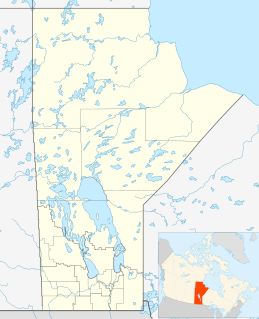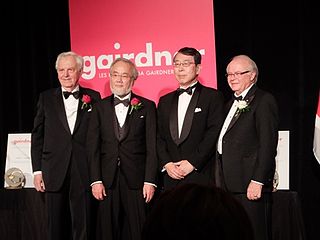
Baylor College of Medicine (BCM), located in the Texas Medical Center in Houston, Texas, US, is a health sciences university. It includes a medical school, Baylor College of Medicine; the Graduate School of Biomedical Sciences; the School of Allied Health Sciences; and the National School of Tropical Medicine. The school, located in the middle of the world's largest medical center, is part owner of Baylor St. Luke's Medical Center, part of the CHI St. Luke's Health system, and has hospital affiliations with: Harris Health System, Texas Children's Hospital, The University of Texas MD Anderson Cancer Center, Memorial Hermann – The Institute for Rehabilitation and Research, Menninger Clinic, the Michael E. DeBakey Veterans Affairs Medical Center and Children's Hospital of San Antonio.
Charles H. Hollenberg, was a Canadian physician, educator and researcher.
The Max Rady College of Medicine – University of Manitoba is located in Winnipeg, Manitoba and part of the University of Manitoba. The University of Manitoba, Faculty of Medicine's Arms were registered with the Canadian Heraldic Authority on August 15, 2008.
Arnold Naimark, is a Canadian physician, academic, and former President of the University of Manitoba.

The University of Virginia School of Medicine is the graduate medical school of the University of Virginia. The school's facilities are on the University of Virginia grounds adjacent to Academical Village in Charlottesville, Virginia. Founded in 1819 by Thomas Jefferson, UVA SoM is the tenth oldest medical school's in the United States, and is consistently ranked among the top quartile of research-oriented medical schools by U.S. News and World Report. The School of Medicine confers Doctor of Medicine (M.D.) and Doctor of Philosophy (PhD) degrees, and is closely associated with both the University of Virginia Health System and Inova Health System.

The Health Sciences Centre is the largest hospital in Winnipeg, Manitoba, and one of the largest in Canada. It serves the residents of Manitoba, Northwestern Ontario and Nunavut as both a teaching hospital and as a research centre. The Health Sciences Centre is a tertiary care hospital, encompassing many different specialty medical and surgical services. The University of Manitoba has its Faculties of Medicine, Pharmacy and Dentistry, as well as Physiotherapy, Respiratory Therapy and Occupational Therapy, located on the 32-acre (13 ha) campus.

The Lewis Katz School of Medicine at Temple University (LKSOM), located on the Health Science Campus of Temple University in Philadelphia, PA, is one of 7 schools of medicine in Pennsylvania conferring the M.D. degree. It also confers the Ph.D. and M.S. degrees in biomedical sciences. In addition, LKSOM offers a Narrative Medicine Program.

Pappenheimer bodies are abnormal basophilic granules of iron found inside red blood cells on routine blood stain. They are a type of inclusion body composed of ferritin aggregates, or mitochondria or phagosomes containing aggregated ferritin. They appear as dense, blue-purple granules within the red blood cell and there are usually only one or two, located in the cell periphery. They stain on a Romanowsky stain because clumps of ribosomes are co‐precipitated with the iron‐containing organelles.
Professor Chris Goodnow BVSc, PhD, FAA FRS MNAS is an immunology researcher and the current Executive Director of the Garvan Institute of Medical Research. He holds the Bill and Patricia Ritchie Foundation Chair and is a Conjoint Professor in the Faculty of Medicine at UNSW Sydney. He holds dual Australian and US citizenship.

Larry Kwak is an American cancer researcher who works at City of Hope in Duarte, California and is the Director of the Toni Stephenson Lymphoma Center at City of Hope. Dr. Kwak formerly worked at the University of Texas MD Anderson Cancer Center. He was included on Time's list of 2010's most influential people.
Professor Charles Mark Lwanga Olweny, MBChB, MMed, MD, FRACP, is a Ugandan physician, oncologist, academic and medical researcher. Currently he is a professor of medicine and Immediate past vice-chancellor at Uganda Martyrs University, based at Nkozi, Mpigi District, in Central Uganda.

James Patrick Allison is an American immunologist and Nobel laureate who holds the position of professor and chair of immunology and executive director of immunotherapy platform at the MD Anderson Cancer Center at the University of Texas.
Dr. Allan R. Ronald is a Canadian doctor and microbiologist. He has been instrumental in the investigation into sexually transmitted infections in Africa, particularly in the fields of HIV/AIDS. Ronald is the recipient of multiple awards and honours.
Aubrey Tingle is professor emeritus in the Department of Pediatrics at the University of British Columbia (UBC) and chair of the board of directors at the Maternal, Infant, Child and Youth Research Network. In March 2001, Tingle was appointed the first president and CEO of The Michael Smith Foundation for Health Research (MSFHR).
Doctor James C. Hogg is a Canadian physician.

Doctor John Herbert Dirks is a Canadian physician.
Jawahar (Jay) Kalra MD, PhD, FRCPC, FCAHS, CCPE is a Canadian physician, award-winning clinical researcher, educator, academic leader, and community builder. Dr. Kalra is a professor at the Department of Pathology and Laboratory Medicine at the University of Saskatchewan, a Fellow of the Royal College of Physicians and Surgeons of Canada, the Canadian Academy of Clinical Biochemistry, the Canadian Academy of Health Sciences, an Elected Fellow of the Royal Society of Medicine, UK and a Canadian Certified Physician Executive Leader (CCPE). Dr. Kalra also serves as a member, Board of Governors, University of Saskatchewan and Board of Directors, Council of Canadian Academies (CCA).

Carl H. June is an American immunologist and oncologist. He is currently the Richard W. Vague Professor in Immunotherapy in the Department of Pathology and Laboratory Medicine at the Perelman School of Medicine of the University of Pennsylvania. He is most well known for his research into T cell therapies for the treatment of cancer.
Charis Eng, M.D., Ph.D., is a Singapore-born physician and geneticist at the Cleveland Clinic, notable for identifying the PTEN gene. A now accomplished doctor, she credits her fourth grade science class for inspiring her career and describes her work as "truly the fulfilment of a lifelong dream.
Dr. Frances Estelle Reed Simons is a Canadian physician and researcher. She was named to the Canadian Medical Hall of Fame in 2017.












